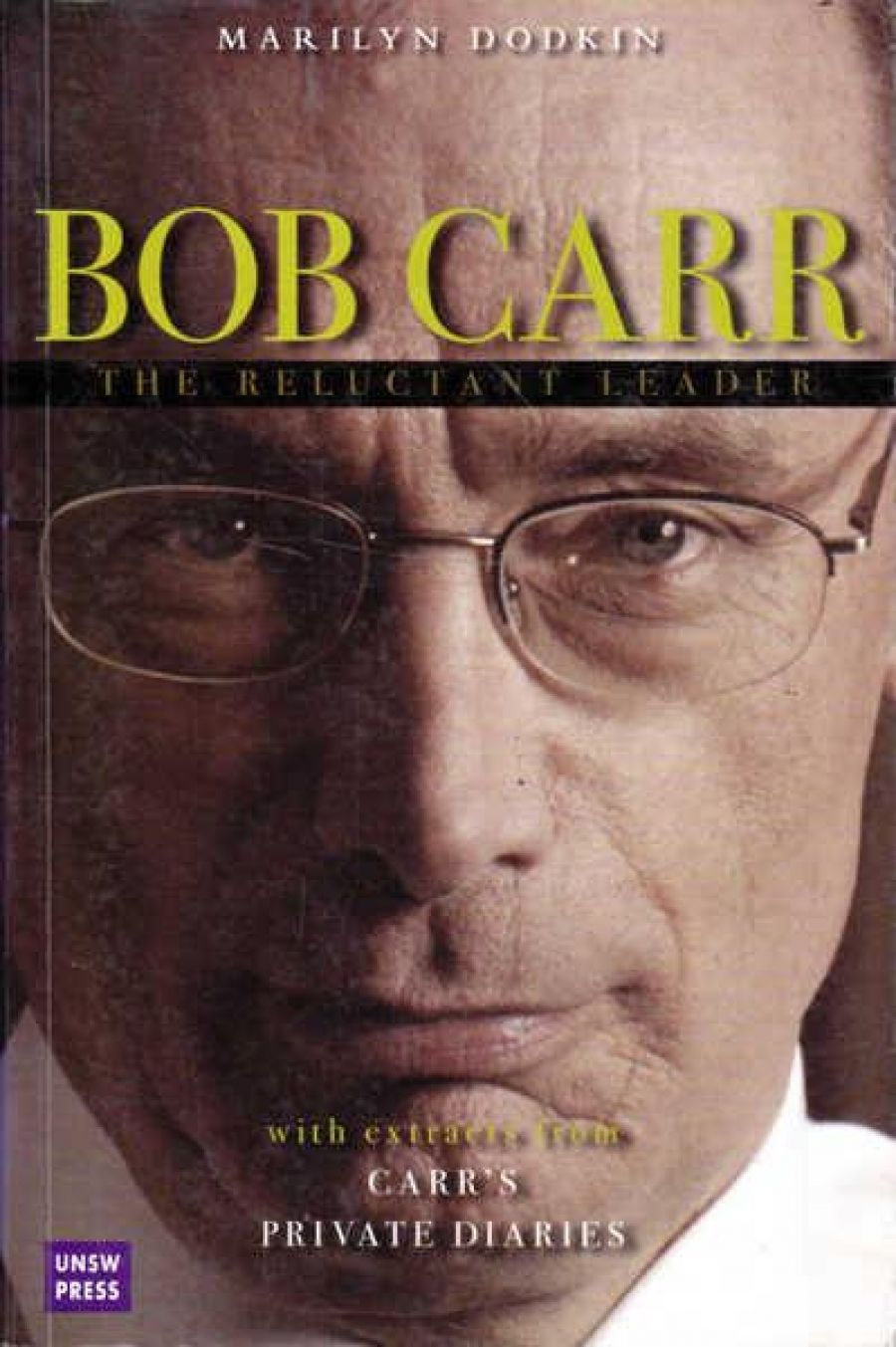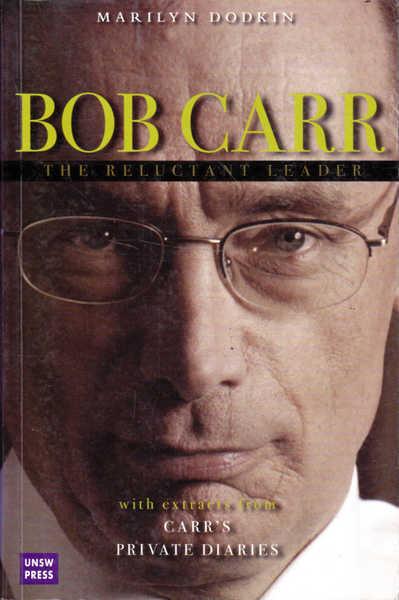
- Free Article: No
- Contents Category: Politics
- Review Article: Yes
- Article Title: A Grand Disrobing
- Online Only: No
- Custom Highlight Text:
Over the past few years, Bob Carr has been tweaking the veils that shroud his inner self. In essays, speeches and book reviews, he has teased and titillated us with glimpses of his diary and extracts from his unpublished autobiographical novel, Titanic Forces. Now, with Marilyn Dodkin’s Bob Carr: The Reluctant Leader, built around Carr’s personal diary, we have a grand disrobing. Although she has used Hansard reports, newspaper files and interviews, there would be no publishable work without the diary, quotations from which average two per page. Indeed Carr’s words constitute some thirty per cent of the book. The diary provides the work’s narrative structure, and, when the diarist flags, so does the book. A result of this approach is that the author’s rather pedestrian prose is often outshone by the diarist’s vivid and sardonic style.
- Book 1 Title: Bob Carr
- Book 1 Subtitle: The Reluctant Leader
- Book 1 Biblio: UNSW Press, $29.95 pb, 301 pp
- Book 1 Cover Small (400 x 600):

- Book 1 Cover (800 x 1200):

But what a revelation it all is, providing an intimate insight into the personality of the diarist, something rarely provided in political autobiography and missing frequently in authorised political biographies. What do we learn about Carr? Even the trivial can be fascinating: without any symptoms, he neurotically subjects himself to colonoscopies and heart calcium scoring. The records of swimming, walking, hiking and gym sessions are exhausting, yet we learn that he is ‘fragile with sports injuries … chronically troubled [with] lower back [pains] and deteriorating physique’. He sees himself in ‘a race against the biological clock’, fearful of becoming ‘a wide-bellied, immobile old grump’.
His reluctance to being drafted into the leadership of the NSW Labor party after the débâcle of 1988 is notorious: ‘I feel as if I’m about to be torn apart in a world of ruthless ambition and vicious intrigue … Political failure and frustration stare me in the face … Fear grips me.’ Understandable, too, is his frequent despair during the bleak years of opposition:
‘There are days I’ve got to force myself into it’ [21 January 1989]
‘My thoughts turn to a way out’ [26 August 1990]
‘The appeal of giving it up’ [16 September 1990].
More surprising are his reservations during the years of triumph. He continually toys with the prospect of a dramatic resignation. ‘Terrific, I thought, a caucus revolt … Bring it to a head; let me walk’ [28 May 1998]; ‘Retire on a matter of principle – workers comp – and get out while I’m popular’ [31 March 2001]; ‘I should have quit at the start of the year’ [10 July 2002]. And always there is a haven, that other Eden – Europe:
[L]iving a life of ‘elegant curiosity’ based in Europe … drizzly Sundays in European cities … crowds drifting through squares and across parks, museums and art galleries; trams glide by; news kiosks; stop in a café for coffee and cake …fantasy supreme.
For Carr, faced with party troubles, Europe is always a refuge that beckons, as in May 1989: ‘If I’m deposed I’d simply book myself into the Bayreuth and Salzburg Festivals. So long, suckers’; or again in January 1990: ‘If they want to throw me out they can and I’ll make the Verona musical festival this year.’ In the later years, this is offset by the sheer joy of being premier. ‘I never enjoyed being premier more …I love leadership, doing things in the public good.’
Although bred in the unforgiving world of the NSW right and driven by the exhilaration of ‘spit[ing] my enemies again – one of the great joys of politics, perhaps the greatest’, Carr is on the whole generous to his opponents. Exulting in his own victories, he laments the Liberal careers he has wrecked. On the evidence provided here, only two figures seem to excite a deeper ire: his local rival, Peter Anderson, and his interstate one, the Victorian Jeff Kennett. For the latter he seems to have had an instinctive dislike – ‘the most vainglorious politician I know’ – and Carr simply ‘revel[led] in [his] humiliation’.
The tale of how Carr, a right-wing leader, destroyed Anderson, another right-winger, by secretly conspiring (‘they still haven’t found my fingerprints on the axe handle’ ) with the left to deny Anderson preselection, is as calculating as anything in Machiavelli. ‘He talked once too often about leadership, so I chopped his head off.’ It is, however, accompanied by a gleeful celebration of the assassination that would have repelled the austere Florentine:
I was like a B29 pilot clutching the controls while steering through flak over the Rhineland. Ha! Ha! Leadership: worth having and worth fighting to keep – yes, with Stalin-like brutality if necessary.
Apart from winning, what is it that drives Carr? He is a more activist premier than Wran, but what drives his policy initiatives is not easily identified. A distaste for lawyers – ‘the undeserving’ – seems to propel his reforms in conveyancing, accident compensation and workers’ compensation. A real passion for the environment pulses through the diary, but even here much-boosted projects are subject to pragmatic U-turns. He is not given to policy heroics, though his ultimately failed battle for electricity privatisation was an exception, as was his support for a medically supervised heroin injection room. More typically, he is cautious, conservative and reactive. This last characteristic is perhaps best reflected in the law-and-order auctions that have disfigured recent NSW elections. ‘“Worst killers cemented in their cells” – so go the front pages on Saturday’, he writes, ‘after my media conference on Friday … Our tough response blots out [Opposition] campaign’.
Dodkin has used the diary to construct a workman-like framework for the Carr years. But its use is a handicap as well as a blessing. She allows it to provide the narrative drive, and when the diary falters so does her story. This is most noticeable in the months preceding the crucial 1991 election, when Carr kept no diary because ‘things just became too depressing to record’. Yet this election, which destroyed the Liberal majority, if not yet the Liberal government, was the making of Carr. Dodkin recognises this, calling her chapter ‘The Turning Point’, but we get no real explanation for this stunning and unexpected Liberal reversal.
Indeed, the book as a whole lacks much in the way of political analysis, the author being content to provide a competent narrative. Given that the hero himself is responsible for much of the book, it is not surprising that there is but faint criticism. These are flaws that could and should have been attended to if the author had stood back a little and reflected on her hero and his times.


Comments powered by CComment